Cycloneland at the state fair
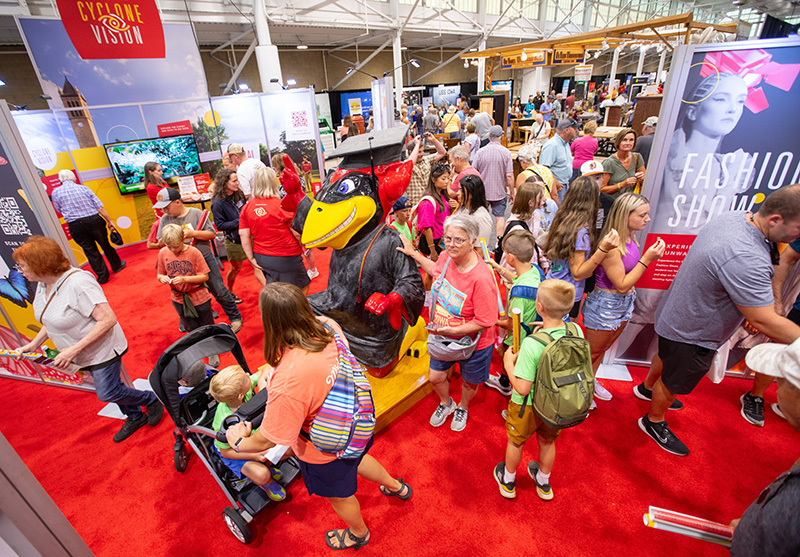
Photo by Christopher Gannon.
Attendance at the Iowa State Fair has been unusually high, and visitors jam the Iowa State University exhibit in the Varied Industries Building, as pictured here on the first day of the fair. Visitors are invited to try "Catch the Cyclone Vision," which offers a selection of 360-degree videos highlighting unique campus experiences they enjoy on their smartphones. Visitors also can take their picture with graduation Cy, and pick up an ISU football poster, schedule card or free waterless temporary Cyclone tattoo. The fair runs through Sunday, Aug. 18.
Reeder selected to lead operations and finance division
Dr. Sean Reeder has been named Iowa State's senior vice president of operations and finance, effective Sept. 3. His appointment is pending approval by the state Board of Regents.
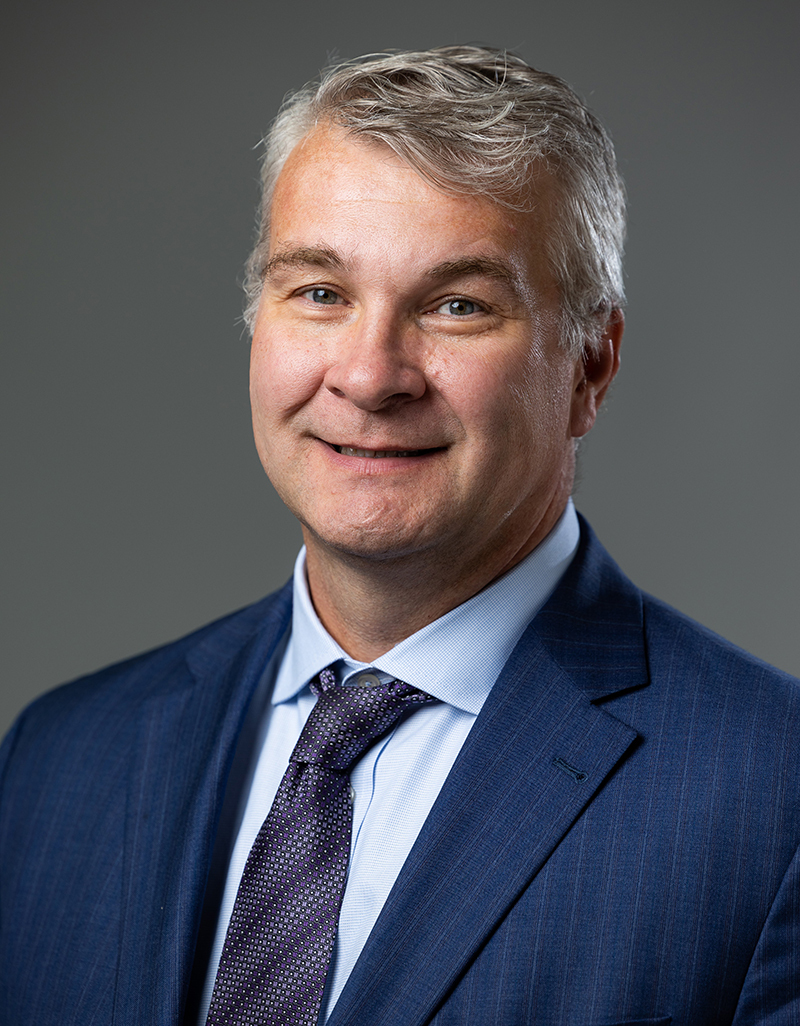
Sean Reeder
Reeder serves as vice chancellor for finance and administration at the University of Missouri, Kansas City. He served previously as vice president for business affairs and chief financial officer at Eastern Illinois University, Charleston (2020-22). He has extensive experience in capital projects, utilities, real estate development and university technology transfer at the University of Illinois, Urbana-Champaign (2009-20); and Michigan State University, East Lansing (2008). His career also includes roles in private sector real estate development, venture capital and capital projects engineering.
"Dr. Reeder has the right blend of experience, knowledge and accomplishments to excel in this position," said President Wendy Wintersteen. "I and the senior leadership team look forward to working with him as we continue to build on Iowa State's strengths and land grant mission."
Reeder earned a bachelor's degree in general engineering, a master's in business administration and a Ph.D. in education policy, organization and leadership, all from the University of Illinois. He is a veteran of the U.S. Navy.
"Iowa State University is an amazing example of what the land-grant research university can be," Reeder said. "President Wintersteen has laid out a bold strategic plan, and I am ready to roll up my sleeves and get to work in delivering this plan. ISU's mission, vision and values align with my own, and I'm honored to join the Cyclone family."
The operations and finance division includes a range of units that serve students, faculty and staff, organized in several clusters:
- Finance
- Financial planning and analysis
- Facilities planning and management
- Auxiliary units such as the ISU Book Store, Reiman Gardens, museums, printing, transportation services and Veenker golf course
- Real estate and capital planning
Ivy College of Business dean David Spalding will continue in the role of interim senior vice president until Reeder's arrival on campus.
Wintersteen expressed appreciation to division staff who participated in the interview process last month and to the search committee chaired by Jason Henderson, vice president of ISU Extension and Outreach.
Legacy software systems will become read-only
Following a final student data upload to Workday from the university's legacy systems at the end of this week, Workday will be one step closer to becoming the go-to for student records and receivables. Data cleanup and verification in Workday will continue through the first half of fall semester, but users no longer will be able to complete processes in the legacy systems, known as ADIN (Administrative Information System) and AccessPlus. They'll become read-only systems. For Graduate College functions, read-only occurs Sept. 1.
Instead, processes will be completed in Workday or other designated system.
"Until now, pieces of student information had to be entered and maintained in both legacy systems and Workday, which takes a lot of energy," said project functional lead Geoff Janes, IT senior manager in admissions. "With this transition, that weight is largely lifted."
This weekend's data update is the fourth -- others were in March, May and July -- to supplement the initial large data upload to Workday in January. This final update mostly contains registration and course information for summer 2024, the final academic term conducted in AccessPlus.
New and returning students registered for fall classes in Workday, so faculty and staff should use that system to view the most accurate fall semester information. Otherwise, students' most accurate academic history will still be (read-only) in AccessPlus at this time.
Looking ahead
As the fall semester progresses, final data will be loaded into Workday and verified. Around the middle of the semester -- mid-October or so -- Workday officially will become the system of record with the most comprehensive student information data. The university community will be notified when this change occurs. Workday already is the system of record for university human resources and finance data.
Learning aids
As faculty, staff and students start to use Workday regularly for student processes, they have access to a library of more than 150 how-to articles for performing tasks, for example viewing class rosters. Articles can be found on the WorkCyte website's training page or in the ISU service portal. For those looking for a deeper dive into some processes, Workday Learning includes 15 digital courses. In "Learning" in your Workday portal, select the "browse learning" button, then enter "Workday Student" in the search bar.
Questions about viewing academic history information can be served with a Workday Student Support online help ticket. Feedback may be submitted to workcyte_feedback@iastate.edu.
Decades in the making
The last large data upload to Workday marks a significant shift in the decades campus employees have committed to launching, maintaining and improving the legacy systems. The first component of the ADIN system came online in the late 1970s, and AccessPlus launched in 1996.
Welcome
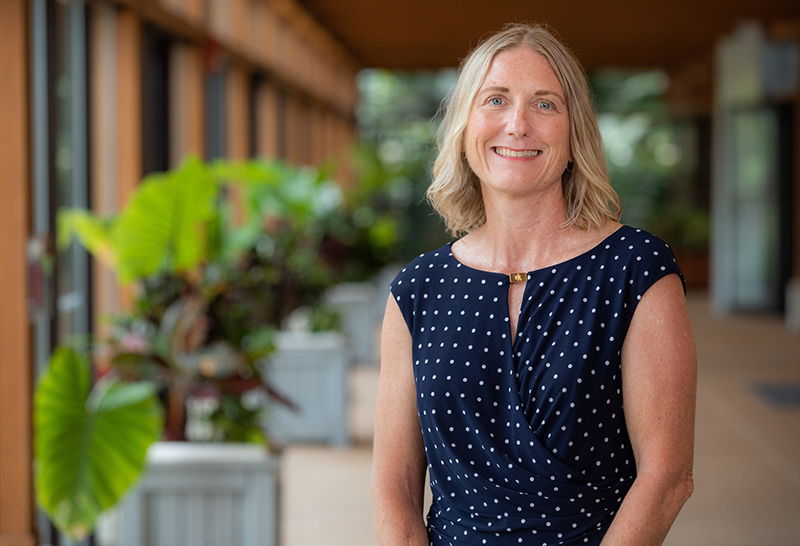
Christine Prescott-Jacobsen is the director of Reiman Gardens. Photo by Christopher Gannon.
Alumna Christine Prescott-Jacobsen began serving as director of Reiman Gardens on Aug. 1. She provides strategic leadership and direction while overseeing daily operations, assisted by a team of 24 employees.
Prescott-Jacobsen returns to Ames from Omaha, where she served for six years as director of education at Lauritzen Gardens, the city's member-supported botanical center. She managed the education staff including the volunteer coordinator, engaged with donors and managed the education budget. She served on the steering and design committee for a $28.5 million capital campaign that included an innovative, multidisciplined children's garden. Previously, for 21 years she worked as an information education specialist with Nebraska's Papio-Missouri River Natural Resources District, one of 23 such districts in the state. Her responsibilities included educational programs and camps, public relations (website, social media, newsletters, media relations) and curriculum development for teachers. She held the district's permit to house two raptors for educational programs.
Her numerous volunteer commitments include board positions for the Audubon Society of Omaha and Fontenelle Forest, a nature preserve south of Omaha.
Prescott-Jacobsen earned a bachelor's degree in animal ecology from Iowa State and a master's degree in public administration from the University of Nebraska, Omaha.
Her office is 1380 Conservatory Building at Reiman Gardens. She can be reached by phone at 515-294-6212, by email at cprescot@iastate.edu.
New DEI law takes effect in July 2025
University leaders are working with the state Board of Regents to determine what actions are needed to comply with Senate File 2435, which takes effect July 1, 2025. As actions are determined, guidance will be provided to campus.
Approved by the state legislature and signed into law in May, the bill imposes restrictions on diversity, equity and inclusion offices at the regent universities, which are broadly defined by the law and may include some programs, policies and training in colleges, departments and units across campus. The legislation includes exceptions for activities related to compliance with state and federal law and accreditation standards, and also contains exemptions for academic departments, student recruitment and student organizations. The legislation does not directly impact academic coursework or research.
Regents' DEI directives
The state Board of Regents' 10 diversity, equity and inclusion directives were approved in November 2023. Iowa State's implementation plan of the directives was informed by a 14-member focus group of students, faculty, staff and administrators. To maintain compliance, colleges, departments and units should observe the following:
- Iowa State has a robust set of programs and services in the Divisions of Student Affairs and Academic Affairs and in every college that are critical for student educational success. All related websites and promotional materials must clearly state these programs and services are available to all students.
- No employee, student, applicant or campus visitor should be compelled to disclose their pronouns. Anyone may voluntarily disclose their own pronouns. The Faculty Senate amended the Free Expression Syllabus Statement to comply with the pronoun directive. Faculty are required to include this statement in all course syllabi.
- The name of the curriculum requirement now known as U.S. Cultures and Communities was changed to better reflect the array of options available to students and ensure a breadth of course offerings.
- Annual guidance will be issued on maintaining a clear separation between personal political advocacy and university business and employment activities. This guidance is available on the office of the president's federal and state relations website.
- As required by Board Policy 4.2.I, the university will not issue statements or campus-wide messages on matters of public concern unless they are central to the university's mission or critical operations. Please refer to the university's guidance on campus messages and statements.
Vet Med students have visible role at state fair
Little feet and big eyes.
For fourth-year veterinary students Chelsea Harris and Carly Bates, that description applied to any of the piglets they helped a sow deliver on the first day of the Iowa State Fair, Aug. 8. Even more memorable were the same features on all the children who walked by with their parents at the farrowing display in the Knapp Animal Learning Center.
"Being able to work with the public is one of the great things about this job," Bates said. "It is so great to see so many people who may not know a lot about the agricultural industry getting their eyes opened on what my counterparts and I do on a daily basis."
Harris and Bates are two of six fourth years working for two weeks to protect the health and safety of every animal on the fairgrounds. It is one of numerous two-week rotations fourth-year students complete during their final year at the College of Veterinary Medicine, but it is an experience unlike almost any other.
"I didn't grow up on a farm … so I had never touched a horse before I got to vet school, and now I am out here giving them meds," Harris said. "Today, I had a kid come up to me and I had to explain what was happening with the farrowing display. They get super excited and it makes me happy."
Harris and Bates showed animals at the fair growing up in Iowa and see their service as giving back for positive and fun experiences.
In the public eye
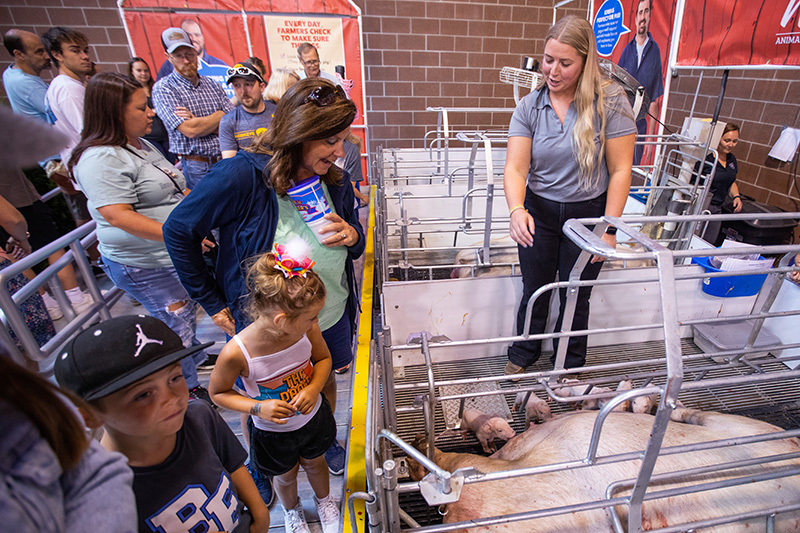
Fourth year Iowa State veterinary medicine student Carly Bates talks with visitors passing through the farrowing exhibit inside the Knapp Animal Learning Center at the Iowa State Fair. Photos by Christopher Gannon.
The biggest benefit of the experience for the students may be the chance to develop and build communication skills.
"I hear often that a lot of people wanted to be in veterinary medicine so they didn't have to work with people, but I don't think that is accurate," Bates said. "Communication is a huge aspect because you have to work with clients, and communicating with them is the biggest part of our job."
Bates said their classroom work helps students understand the scientific side of animal health, but how they translate that knowledge into beneficial information for animal owners and the public can determine success. Learning about how owners handle animals is key when determining treatments and making health decisions, Harris said.
Must multitask
The students' efforts are part of ISU's veterinary field services unit -- reinstated in 2012 -- which emulates a private practice within the university. During the fair, students examine and treat animals under licensed veterinary supervision with fairgoers watching every move.
"It gives our students basic skills and gives them the most variety they will see in their fourth year," said clinical associate professor Rachel Friedrich. "They go down the Monday before the start of the fair and are there throughout to take care of any health issues that pop up."
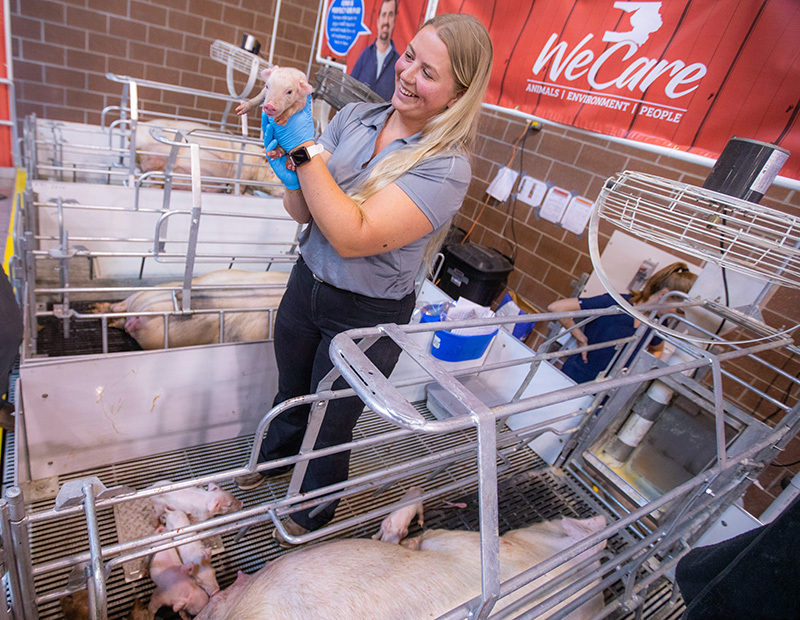
Carly Bates holds a newborn piglet at the farrowing exhibit. Bates and five other fourth-year students are helping care for all of the animals on the fairgrounds during the Iowa State Fair.
Friedrich said downtime is a rarity since students sleep at the fairgrounds, but that doesn't discourage applications to take part.
"They have to send me a letter of intent, a copy of their resume and references," she said. "It acts like a mini job interview that mimics what you have to send to a practice when you apply for a position."
In addition to being the first line of health care, students help collect urine samples for random drug testing to ensure competitor honesty and safety for animals that eventually enter the food chain. Students also assist the state veterinary office health inspect and confirm paperwork for every animal at the fair.
"All of the champions for the various food animal shows are tested for at least 80 different things," Friedrich said. "The inspections are done in the event that there is a disease outbreak of some sort, so we can track the animal."
Preparation for the fair begins a year in advance for the field services unit and offers students experience that will be put into practice almost immediately upon graduation.
"When we graduate, this is what we are going to be doing," Bates said. "Whether it's at the county fair level or the state fair, we are going to be doing stuff like this when we are the doctors."
LeBaron demolition begins next week
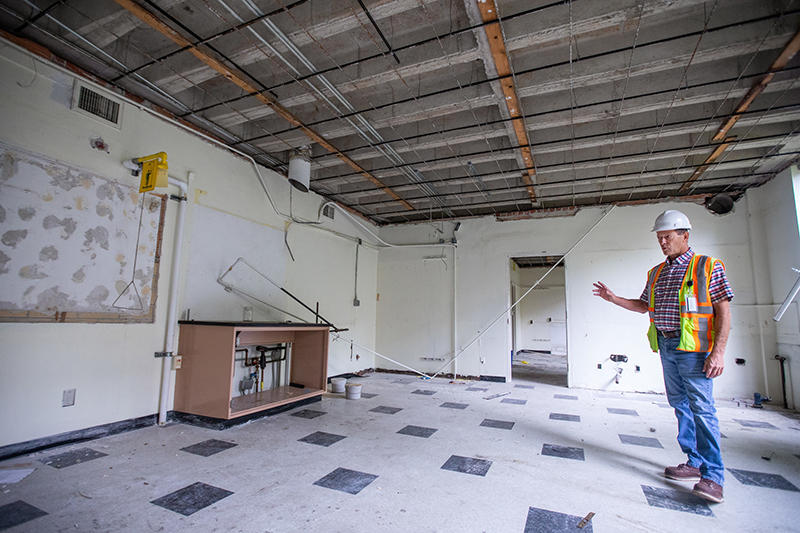
Construction manager Bart Dobson, facilities planning and management, summarizes the internal abatement and materials removal necessary before LeBaron Hall is ready for demolition. Photos by Christopher Gannon.
Following about seven weeks of abatement and indoor materials removal, crews are ready to demolish what remains of the 66-year-old LeBaron Hall on central campus. Some interior demolition, including the west walls that divide LeBaron from the Human Nutrition Sciences Building, are being removed this week. Demolition and removal of the building structure is scheduled to begin Monday and take about two weeks.
The College of Human Sciences' $39 million project to replace LeBaron with a state-of-the-art teaching and laboratory facility will continue into fall semester 2026.
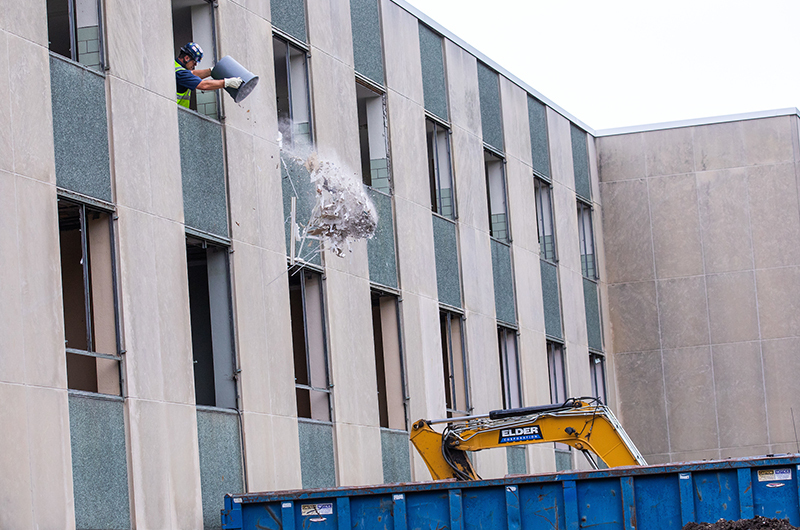
A worker tosses one of the last buckets of debris into a dumpster outside LeBaron Hall Tuesday morning.
Operating budget grows by nearly 5%
Approved July 31 by the state Board of Regents, Iowa State's general fund operating budget is $802.3 million for the fiscal year that began July 1. This is an increase of $34.7 million -- nearly 5% -- over a year ago. Incremental increases come from:
- Student tuition, $27.8 million
- General university state appropriation, $4.3 million
- Administrative costs recovery on externally funded research, $2.2 million
- Two special purpose state appropriations, $0.2 million
- New special purpose appropriation (Extension forestry), $0.15 million
Tuition dollars account for about 65% (an estimated $519.1 million) of the revenue in the general fund operating budget. State appropriations totaling $239.4 million is the other significant revenue source in the operating budget at just under 30%. Federal support for ISU Extension and Outreach (2%) and revenue from services and recovered costs on externally funded research (just over 3%) round out the revenue sources.
Associate vice president for financial planning and analysis Bonnie Whalen said leaders identified several priorities for the new revenue:
- Employee salaries and benefits, including annual increases, promotions and net new positions in all employee categories: faculty, merit, P&S, post-docs and graduate students.
- Student financial aid.
- Building repairs and equipment purchases.
Support for livestock, forests
Several special purpose units at Iowa State received a total of $350,000 in additional directed state appropriations this year. Two annual appropriations that support the state's livestock industry each received $100,000 more in operating support from the 2024 legislature. Iowa State's Veterinary Diagnostic Laboratory has the largest caseload of any VDL in the country. The additional funds help keep testing affordable for Iowa farmers and provide a steadier income stream than test fees. State support for the VDL this year is $4.6 million.
And an additional $100,000 for Iowa State's livestock disease research program is seed money to leverage research funding from public and private sources and address top concerns in the state's livestock and poultry industries. State support for livestock research this year is $291,390.
A first-time directed state appropriation of $150,000 is for a regional forestry specialist position in ISU Extension and Outreach who will serve the northeast part of the state. With approximately 85% of Iowa's woodlands privately held, landowners and farmers play a crucial role in caring for this natural resource. But surveys indicate most of Iowa's woodland acres are passively managed with their owners unaware of the technical service, financial and educational resources available to them. The specialist will collaborate with university, state agency and organization partners to promote forest management, and provide technical assistance and education to private landowners and public woodland stewards through individual consultations, workshops and virtual programs. About 40% of the new funding is for supplies and services.
The bigger picture
The general fund budget is less than half of the university's overall budget of $1.7 billion this year. Other pieces of the overall budget come from auxiliary units that receive no state support (for example, athletics, residence, student health center, recreation services and campus utilities) and activities whose funding is restricted for a specific purpose (such as building projects, sponsored research, private gifts, student fees, fees for services and endowment income). Those budgets total $919.8 million.
Petersen's limestone maidens are back on central campus
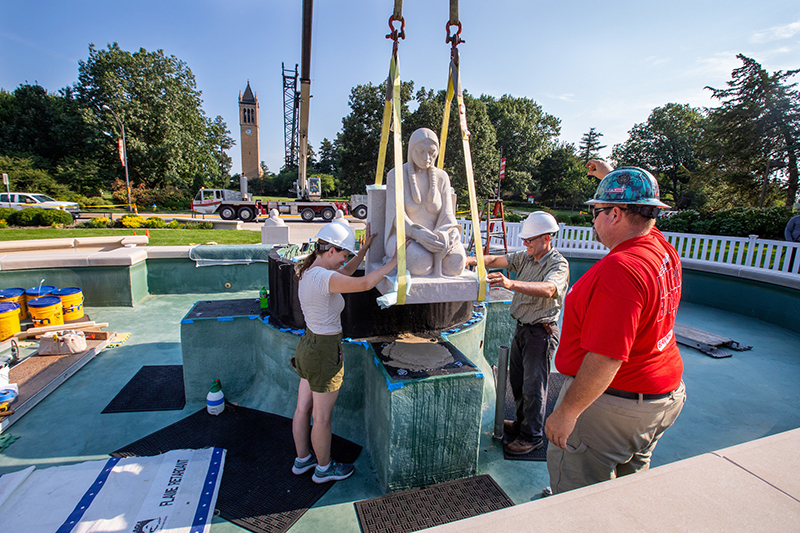
University museums curator Sydney Marshall (left) and art conservator Francis Miller (center) guide the first limestone sculpture to its fountain ledge while Chris Gerver, Barnhart Crane and Rigging, hand signals to his colleague on Union Drive. Photos by Christopher Gannon.
After a 21-month absence from the Memorial Union front lawn, the four limestone maidens in Christian Petersen's Fountain of the Four Seasons sculpture were returned to their posts Aug. 5. Despite their weight -- each is about 1,100 pounds -- the work was completed in just under two hours.
Except these are replicas of the four maidens removed in November 2022, meticulously created in the likeness and spirit of Petersen's 1940 originals. Eighty years of rain, ice and wind eroded the surfaces of the four maidens to the point that university museums opted to have replicas carved while it's still possible to recreate detail from the originals.
"I think they're fabulous. You can see so much detail," said university museums director Lynette Pohlman, who watched with immense satisfaction as the sculptures were lowered into place, one by one.
Learn more
The story of the influences on Christian Petersen's creation of the Fountain of the Four Seasons is captured in an exhibition at the Christian Petersen Art Museum, Morrill Hall, that's been extended through the end of fall semester.
Observed a photographer also watching the work, "It feels like we're seeing the same maidens, except these are in focus."
(Ten days into the Paris Olympics), Pohlman also noted, "To me, our 'Eiffel Tower' moment on this campus is from the Memorial Union front steps, past the fountain and the campus green to the campanile.
"That's our most cherished view. You know where you're at," she added. "So it's wonderful to have the two back together again."
Up next
There's still work to be done before the fountain gets turned on the afternoon of Friday, Oct. 4. Connecticut artist and art conservator Francis Miller continues to work on the sculpture, grouting and pointing to prevent water damage and putting the terra cotta ring pieces back in place.
The basin also will receive a third coat of green sealant this month, and then all those waterproofing products will cure for about six weeks. (The green color also replicates Petersen's original design for his fountain.)
A pool and fountain for the Memorial Union's north lawn date back to 1937. Petersen's limestone maidens and terra cotta ring were added in 1941 after the university artist-in-residence proposed the concept to President Charles Friley in 1940.
Pohlman said museums staff considered other mediums -- bronze, granite, cast stone, for example -- before choosing limestone for the replica maidens.
"In the end, we came back to the idea of a faithful replication, doing it as Petersen did it," she said.
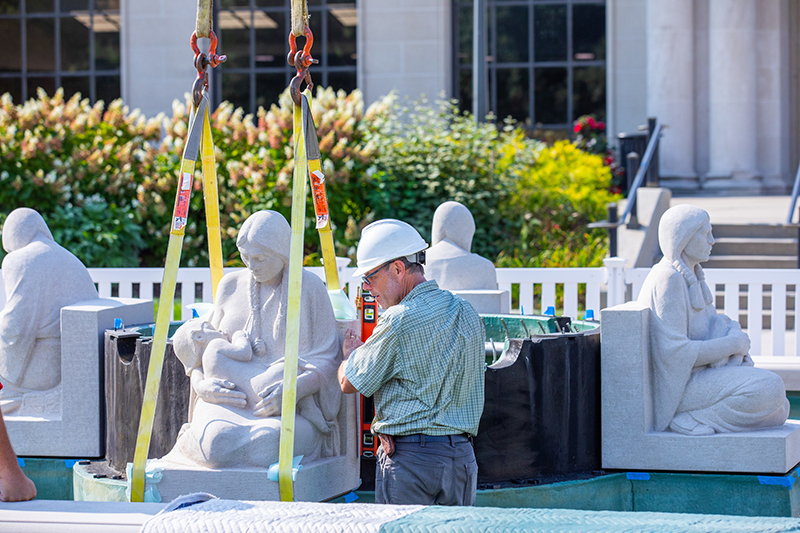
Art conservator Francis Miller uses a level to assess the temporary position of the fourth maiden on the Fountain of the Four Seasons.
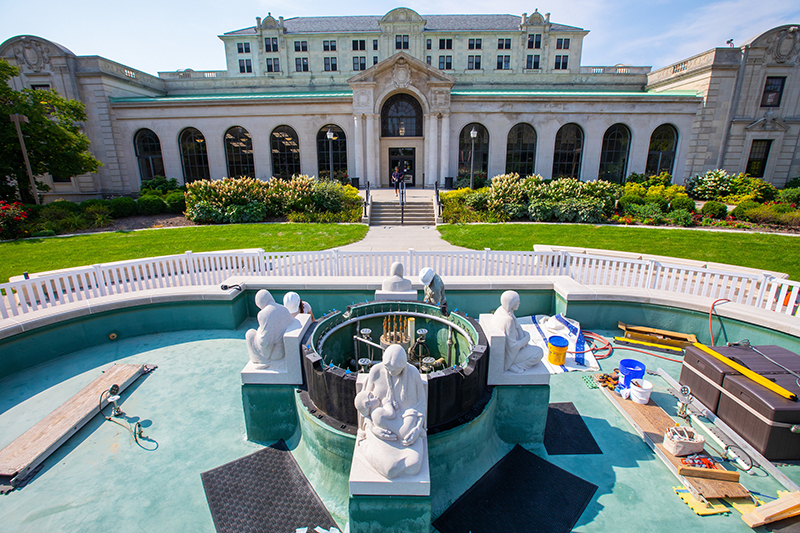
The fountain and basin have become Miller and Marshall's workspace since the four replica maidens were installed on the north lawn of the Memorial Union. Petersen's original terra cotta pieces will cover the black ring around the fountain.
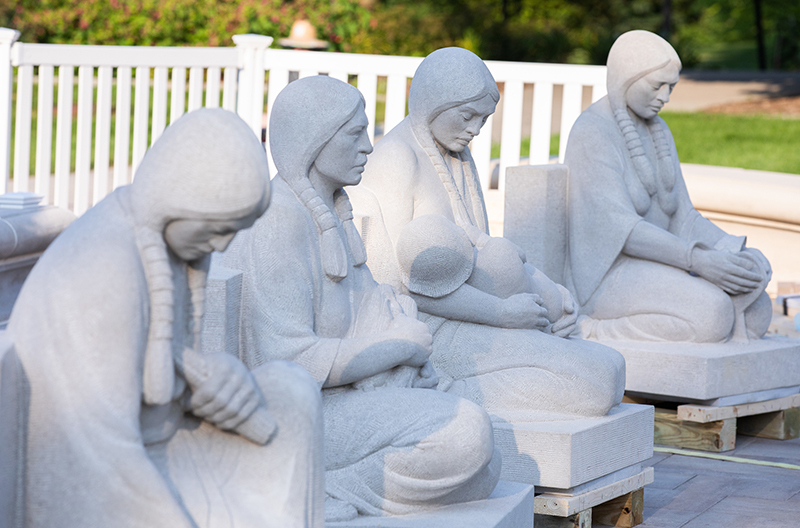
The four limestone sculptures await their final transfer the morning of Aug. 5.
Student welcome events run Aug. 23-25
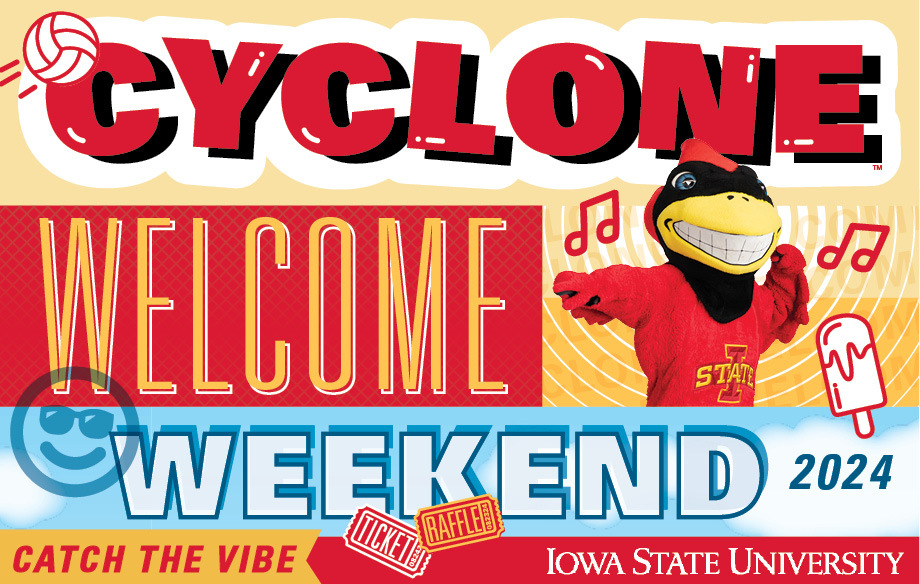
Iowa State's third annual Cyclone Welcome Weekend, Aug. 23-25, will celebrate the start of a new academic year with all-day programming on Saturday, Aug. 24. "Catch the Vibe" kicks off with a Friday evening cookout (6-8 p.m.) at Lied Recreation Center. All new and returning students are invited to these free events. They'll need their university ID to participate.
Cyclone Welcome Weekend is coordinated by the division of student affairs and assisted by many. Within about 48 hours of an Aug. 8 request, faculty and staff had filled nearly 100 volunteer slots, either for the weekend events or preparatory tasks Aug. 19-20.
The Friday cookout and much of Saturday's programming is coordinated with Destination Iowa State events for first-year students. Saturday on-campus events include:
- 8 a.m.-noon, G.O.A.T. breakfast served, central campus, yoga sessions with goats begin at 8:15 a.m. and 9 a.m.
- 11 a.m.-5 p.m., Gallery of Games, MU Great Hall, tabletop and board games
- Noon-3 p.m., Bug Village, offered by the ISU Insect Zoo, displays, costume contest, bug treats, Advanced Teaching and Research Building
- 1-3 p.m. (second session 3-5 p.m.), Nerdology, trivia team game show with prizes hosted by improv comedians, MU Sun Room
- 1-3 p.m., Colossal Volleyball Clash, volleyball with a 40-inch ball, State Gym
- 8:30 p.m. (doors open at 8 p.m.), Hypnotist and comedian Chris Jones, Stephens Auditorium
Additionally, the Ames Public Library will host an open house Saturday for ISU students (11 a.m.-2 p.m., 515 Douglas Ave.). There, they can learn about the library's free services, pick up a library card, win gift cards to Main Street businesses and enjoy games and snacks.
A Sunday addition to Cyclone Welcome Weekend is the inaugural Passport Adventure for students at Parks Library. During this drop-in event (2-5 p.m.), students collect stamps in their passport as they navigate the building to learn about resources and services the library offers for them. To get started, students pick up a passport at the table near the main desk.
